In the world of culinary appliances, the contact grill has become a staple for those who love to cook and entertain. But with so many suppliers and options out there, finding the perfect partner for your custom contact grill project can be a daunting task. That’s why it’s crucial to understand the ins and outs of working with a reputable supplier, the process of collaboration, and what features make a high-quality contact grill stand out. This article will delve into the importance of quality control, guide you through the steps to get started with your custom project, and address some common questions about suppliers and ODM services. Ultimately, we aim to help you transform your grill business with the right supplier by your side.
Discover the Benefits of Contact Grill Suppliers
Contact grill suppliers offer a world of benefits for businesses looking to enter or expand in the outdoor cooking equipment market. From enhanced product quality and customization options to streamlined production processes and cost savings, here’s a closer look at the advantages these suppliers bring to the table.
-
Access to Advanced Grill TechnologiesContact grill suppliers often have access to the latest grill technologies and innovations. This means that the products they offer are not only cutting-edge but also efficient and user-friendly. By partnering with such suppliers, you can ensure that your customers receive the best in terms of cooking performance and safety features.
-
Customization to Meet Your Specific NeedsOne of the standout benefits of working with contact grill suppliers is the ability to customize your products. Whether you’re a retailer looking to differentiate your brand or a manufacturer looking to cater to niche markets, ODM (Original Design Manufacturing) services allow you to create contact grills that reflect your unique specifications and brand identity.
-
Quality Control and AssuranceReputable contact grill suppliers prioritize quality control throughout the manufacturing process. This means that every product that leaves their facility undergoes rigorous testing to ensure it meets the highest industry standards. By sourcing from these suppliers, you can have confidence in the durability and reliability of your contact grills.
-
Cost-Effective Production SolutionsWhen you work with a contact grill supplier, you can benefit from their established production processes and economies of scale. This often results in lower production costs, which can be passed on to your customers, making your products more competitive in the market.
-
Faster Time to MarketBy leveraging the expertise of contact grill suppliers, you can significantly reduce the time it takes to bring a new product to market. These suppliers are well-versed in the production cycle and can help streamline the design, prototyping, and manufacturing stages, allowing you to meet customer demands more quickly.
-
Extensive Product RangeContact grill suppliers typically offer a wide range of products, from compact countertop grills to large commercial grills. This diversity allows you to cater to various market segments and customer preferences. Whether you’re looking for a simple contact grill for home use or a high-capacity unit for a commercial kitchen, you’ll likely find what you need with a reliable supplier.
-
Comprehensive After-Sales SupportA good contact grill supplier not only provides high-quality products but also offers excellent after-sales support. This includes technical assistance, warranty services, and customer service to ensure that your customers have a positive experience with your products.
-
Global Reach and Distribution NetworksMany contact grill suppliers have a global presence and established distribution networks. This means that you can access markets around the world with ease, expanding your business reach and customer base.
-
Innovation and Trend AnalysisContact grill suppliers are often at the forefront of industry trends and innovations. They can provide valuable insights into market trends, helping you stay ahead of the competition and make informed decisions about your product offerings.
-
Environmental SustainabilityIn today’s market, sustainability is a key concern. Contact grill suppliers that prioritize eco-friendly manufacturing processes can help you align your brand with environmentally conscious consumers. This can be a significant differentiator in a crowded marketplace.
By tapping into the resources and expertise of contact grill suppliers, businesses can gain a competitive edge, enhance their product offerings, and ultimately, improve customer satisfaction. The benefits of partnering with these suppliers are clear, making them an invaluable asset for anyone looking to succeed in the contact grill industry.
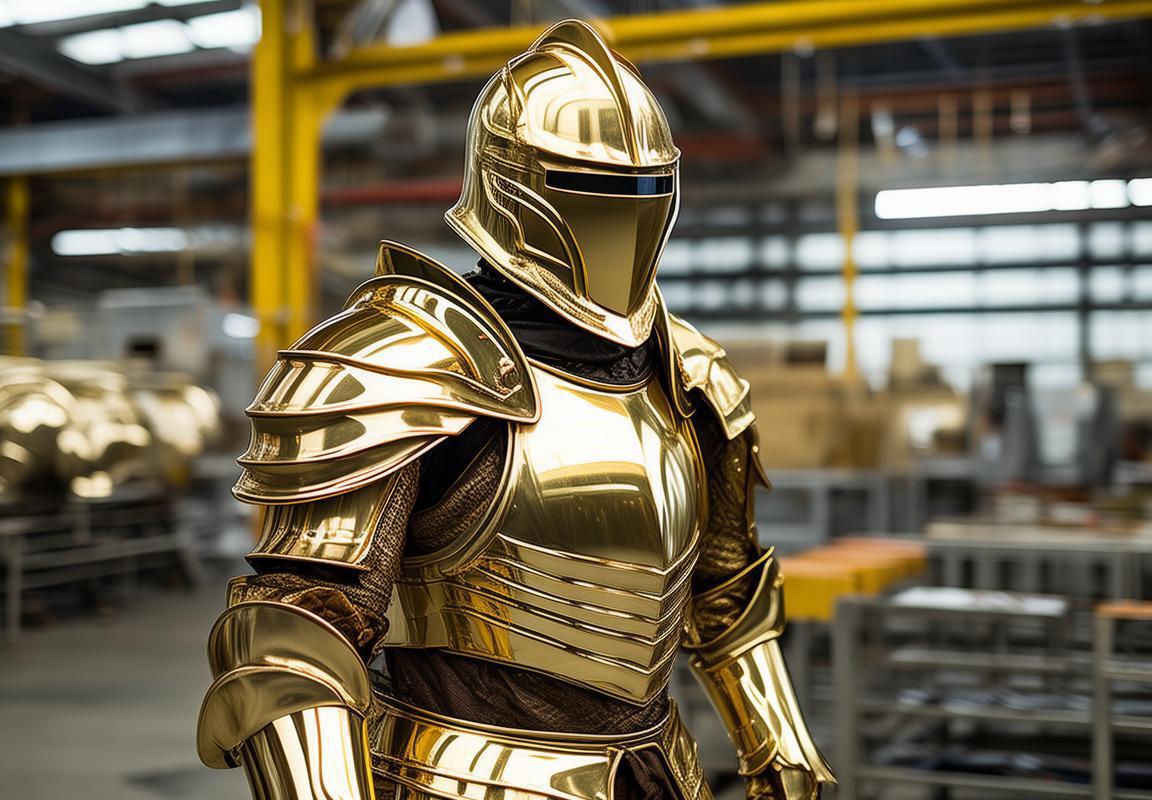
Understanding ODM: Customizing Your Contact Grill Solutions
ODM, or Original Design Manufacturing, is a service that has revolutionized the way products are developed and brought to market. This approach allows companies to leverage the expertise of manufacturers to create customized products that align perfectly with their brand identity and customer expectations. Here’s a deeper dive into what ODM entails and how it can benefit your contact grill solutions.
-
Tailored Design and Functionality: ODM focuses on creating products that are not just mass-produced but also tailored to specific requirements. For contact grill manufacturers, this means designing grills that not only meet the technical standards but also incorporate unique features that set your product apart from the competition.
-
Innovation and Technological Advancements: By opting for ODM, you gain access to the latest technological advancements. ODM suppliers are often at the forefront of innovation, meaning they can incorporate cutting-edge features into your contact grill, such as smart controls, improved heating elements, or even eco-friendly materials.
-
Brand Consistency: A key advantage of ODM is the ability to maintain brand consistency across all product lines. Your contact grill supplier can work closely with your design team to ensure that the aesthetic, color scheme, and logo placement align with your brand’s image, reinforcing brand recognition and loyalty.
-
Cost-Effective Production: While customizing products might seem expensive, ODM can actually be a cost-effective solution. By working with a single supplier who handles the design, production, and quality control, you can streamline the supply chain, reduce overhead costs, and potentially lower unit costs.
-
Flexibility in Product Line Expansion: ODM allows for easy expansion of your product line. If you decide to introduce new models or variations of contact grills, your supplier can quickly adapt existing designs or create entirely new ones to meet the market demands without the need for starting from scratch.
-
Quality Control and Compliance: A reputable ODM supplier will have stringent quality control processes in place. This ensures that your contact grills meet all necessary safety standards and regulatory requirements, giving you peace of mind and building trust with your customers.
-
Reduced Time to Market: With ODM, the time it takes to bring a new product to market can be significantly reduced. Since the supplier is already experienced in the design and production of contact grills, they can efficiently navigate the development process, minimizing delays and getting your product to market faster.
-
Collaborative Development: ODM fosters a collaborative relationship between the manufacturer and the client. This partnership allows for a two-way exchange of ideas and feedback, ensuring that the final product is not only innovative but also practical and user-friendly.
-
Sustainability and Eco-Friendly Options: ODM suppliers are increasingly focusing on sustainability. They can incorporate eco-friendly materials and practices into the production process, allowing you to offer a greener option to environmentally conscious consumers.
-
Custom Packaging and Branding: Beyond the product itself, ODM can also extend to custom packaging design. This ensures that your contact grills are not only high-quality but also beautifully presented, enhancing the overall customer experience.
-
Market Adaptation: The ability to customize your contact grill solutions through ODM means you can quickly adapt to market trends and consumer preferences. Whether it’s a new cooking technique that’s gaining popularity or a shift towards healthier eating habits, ODM allows you to respond swiftly and effectively.
-
Long-Term Partnerships: Building a strong relationship with an ODM supplier can lead to long-term partnerships. This collaboration can result in ongoing improvements to your product line, access to exclusive features, and a competitive edge in the market.
In summary, ODM is a powerful tool for businesses looking to create unique and high-quality contact grill solutions. It offers a blend of customization, innovation, cost-effectiveness, and efficiency, making it an attractive option for companies aiming to stand out in a crowded marketplace.

Why Choose a Reputable Contact Grill Supplier
When it comes to sourcing your contact grill products, selecting a reputable supplier is paramount. Here’s why:
-
Quality Assurance: A reputable contact grill supplier is committed to maintaining high standards of quality in their products. They understand that the reputation of their brand is on the line with every product they sell, so they invest in rigorous quality control measures to ensure that each grill meets or exceeds industry standards.
-
Expertise and Experience: A trusted supplier has likely been in the business for years, offering a wealth of knowledge and experience in the contact grill industry. This means they can provide insights into the latest trends, technologies, and materials that can enhance your product’s performance and appeal to consumers.
-
Customization Capabilities: A reputable supplier offers customization services, allowing you to tailor your contact grill to meet specific market demands or brand identity. Whether it’s adjusting the size, design, or features, a reliable supplier can work with you to create a product that stands out in the marketplace.
-
Consistent Supply Chain: A reputable supplier has a well-established supply chain that ensures a consistent flow of materials and products. This reliability is crucial for maintaining production schedules and avoiding delays that can disrupt your business operations.
-
Competitive Pricing: While cost is always a factor, a reputable supplier understands the importance of offering competitive pricing without compromising on quality. They often have bulk purchasing power and efficient production processes that allow them to pass on savings to their customers.
-
Excellent Customer Service: A supplier with a strong reputation is likely to provide exceptional customer service. They are attentive to your needs, responsive to inquiries, and willing to go the extra mile to ensure your satisfaction. This level of service can be invaluable when you’re navigating complex orders or facing unexpected challenges.
-
Compliance with Regulations: In the contact grill industry, there are various safety and regulatory standards to adhere to. A reputable supplier is well-versed in these requirements and ensures that all their products are compliant, saving you the headache of dealing with legal issues down the line.
-
Innovation and Product Development: A reliable supplier is not just about producing existing products; they are also invested in innovation. They may offer product development services, helping you create new grill models that can give you a competitive edge in the market.
-
Long-Term Partnerships: By choosing a reputable supplier, you’re not just making a single transaction; you’re building a long-term partnership. This can lead to preferential treatment, such as early access to new products, better pricing, and dedicated account management.
-
Brand Reputation: When you partner with a reputable supplier, you’re indirectly enhancing your own brand’s reputation. Customers often associate the quality of the products they receive with the quality of the supplier. A positive relationship with a trusted supplier can reflect well on your brand and build consumer trust.
-
Flexibility in Production: A reputable supplier is capable of handling various production needs, from small batch orders to large-scale production runs. This flexibility allows you to scale your business as needed without worrying about the supplier’s ability to meet your demands.
-
After-Sales Support: A reliable supplier doesn’t just stop at delivering the product; they also offer after-sales support. This can include assistance with installation, maintenance, and troubleshooting, which is especially important for complex products like contact grills.
In summary, a reputable contact grill supplier is a partner you can rely on for quality, expertise, customization, and service. Their commitment to excellence in every aspect of their business ensures that you receive not just a product, but a solution that aligns with your brand’s values and customer expectations.

How to Find the Right Contact Grill Supplier for Your Needs
Navigating the market for a contact grill supplier can be a daunting task, especially when you’re looking for one that aligns perfectly with your specific needs. Here are some key factors to consider when seeking the right supplier for your contact grill requirements:
-
Quality Assurance and StandardsEnsure that the supplier you choose adheres to stringent quality control measures. Look for certifications such as ISO 9001, which guarantees that the supplier maintains high-quality products and services. A reputable supplier will have a robust quality assurance process that includes rigorous testing at various stages of production.
-
Customization OptionsYour contact grill supplier should offer a range of customization options to cater to your unique specifications. This might include different sizes, materials, and finishes. A supplier that allows for customization can help you create a product that stands out in the market and meets the specific demands of your customers.
-
Experience and Industry KnowledgeAn experienced supplier will have a deep understanding of the contact grill industry, including trends, innovations, and the latest technologies. This knowledge can be invaluable in helping you make informed decisions about your product design and material choices.
-
Production Capacity and Turnaround TimeConsider the supplier’s production capacity and the lead time they offer. If you’re looking to launch your product quickly, you’ll need a supplier who can meet tight deadlines without compromising on quality. Ensure that the supplier can scale production to accommodate your order volume, whether it’s a small batch or a large-scale production run.
-
Pricing TransparencyA reputable supplier will provide clear, transparent pricing that includes all costs associated with the production and delivery of your contact grills. Hidden fees can quickly escalate the total cost of your project, so it’s important to have a clear understanding of what you’re paying for.
-
Communication and Customer ServiceEffective communication is crucial in any business relationship. A good supplier will be responsive to your inquiries, provide regular updates on the status of your order, and be accessible for any issues that may arise. Look for suppliers with a strong customer service track record and a willingness to work through any challenges together.
-
Product Range and InnovationA supplier with a diverse product range can offer you more options and ideas for your contact grill. They should be able to demonstrate a portfolio of products that showcases their ability to innovate and adapt to market demands. This can also be an indicator of their commitment to staying ahead of the curve.
-
International ExperienceIf you’re targeting a global market, consider a supplier with experience in exporting. They should be familiar with international shipping regulations, customs requirements, and the logistics of international trade. This can help streamline the process and ensure your products reach customers around the world efficiently.
-
Environmental ResponsibilityIn today’s market, sustainability is a significant factor for many consumers. A supplier that prioritizes environmental responsibility by using eco-friendly materials and processes can enhance your brand’s image and appeal to eco-conscious customers.
-
References and TestimonialsBefore making a final decision, ask for references and read through customer testimonials. This can give you insights into the supplier’s reliability, the quality of their products, and their overall customer satisfaction levels.
-
Technical Support and TrainingA reliable supplier will offer technical support and training for your team, especially if you’re introducing a new product or technology. This can help ensure a smooth transition and successful implementation of the contact grills into your business operations.
-
Long-Term Partnership PotentialFinally, consider whether the supplier is looking to establish a long-term partnership with you. A supplier that views your business as a long-term client is more likely to be invested in your success and to go the extra mile to meet your needs.
By carefully evaluating these aspects, you can find a contact grill supplier that not only meets your immediate needs but also supports your business goals and fosters a strong, mutually beneficial relationship.

The Process of Working with an ODM Contact Grill Supplier
Navigating the world of ODM (Original Design Manufacturer) contact grill suppliers can be a game-changer for businesses looking to offer unique and tailored products to their customers. Understanding the process and what to expect can help ensure a smooth and successful collaboration. Here’s a breakdown of what it’s like to work with an ODM contact grill supplier:
-
Initial Contact and Needs AssessmentStarting the process, you’ll reach out to potential suppliers to discuss your specific requirements. This could include the type of grill you’re looking for, desired features, target market, and any branding or customization you want to incorporate. The supplier will then assess your needs, ensuring they can deliver a product that aligns with your vision.
-
Design and PrototypingOnce the needs are established, the supplier will move on to the design phase. This involves creating sketches, 3D models, and potentially physical prototypes. You’ll be involved in this process, providing feedback and making adjustments as needed. Prototyping is crucial to ensure the design meets your expectations and can be manufactured efficiently.
-
Material Selection and Quality AssuranceThe choice of materials is critical in the contact grill industry. The supplier will discuss various options with you, balancing cost, durability, and performance. Quality assurance protocols will be put in place to ensure that the materials used are of the highest standard. This includes material certifications and testing to confirm compliance with industry standards.
-
Manufacturing and Production PlanningWith the design and materials confirmed, the supplier will outline the production process. This includes setting up the manufacturing line, ensuring all necessary machinery is in place, and planning for the production timeline. You’ll be kept informed about milestones and any potential delays, allowing for timely adjustments if necessary.
-
Iterative Feedback and RefinementAs the production begins, the supplier will provide you with samples or early batches for your review. This is your opportunity to provide feedback on the product’s performance, aesthetics, and functionality. The supplier will then refine the product based on your input, possibly iterating several times to achieve the perfect final product.
-
Quality Control and TestingThroughout the production process, quality control measures are in place to prevent defects. This includes inspections at various stages, from raw materials to the final assembled product. Testing is conducted to ensure that the contact grill meets safety standards and performs as intended.
-
Branding and CustomizationIf your product requires branding or customization, the supplier will coordinate with you to apply your logo, color schemes, or any other design elements. They’ll ensure that these are integrated seamlessly into the product without compromising its functionality or durability.
-
Packaging and ShippingOnce the contact grills are complete and pass all quality checks, they will be packaged according to your specifications. The supplier will handle the logistics of shipping, ensuring that the products are securely packed and delivered to your desired location or directly to your customers.
-
Post-Production SupportAfter the grills have been shipped, the supplier should offer post-production support. This includes addressing any warranty claims, providing technical assistance, and possibly offering additional services like maintenance or repairs.
-
Long-Term Relationship BuildingThe final aspect of working with an ODM contact grill supplier is the potential for building a long-term relationship. This means ongoing communication, regular updates on new technologies or design trends, and the supplier’s willingness to adapt to your evolving needs.
Throughout this process, it’s important to maintain clear and open communication with your supplier. This ensures that both parties are aligned on expectations, timelines, and quality standards. An ODM contact grill supplier should be a partner who is committed to your success and is ready to navigate the complexities of product development and manufacturing.

Top Features to Look for in a High-Quality Contact Grill
In the quest for a high-quality contact grill, it’s crucial to know what features to look for. Here’s what you should consider:
The Material of the Grill PlatesThe durability and performance of a contact grill often hinge on the quality of its plates. Look for grills with thick, high-grade stainless steel plates. They should be able to withstand high temperatures without warping or bending. A non-stick surface is also a must, as it ensures easy cleaning and prevents food from sticking.
Even Heat DistributionA well-designed contact grill should distribute heat evenly across the entire cooking surface. This is key for achieving consistent results and ensuring that your food is cooked thoroughly without overcooking the edges. Check for features like a ceramic or porcelain-coated heating element that promotes even heat distribution.
Adjustable Temperature ControlNot all cooking requires the same level of heat. A high-quality contact grill should offer precise temperature control, allowing you to adjust the heat based on the type of food you’re cooking. Look for a grill with a temperature range that suits your needs, from searing steaks to delicate fish fillets.
Easy-to-Use ControlsThe interface of the grill should be straightforward and easy to navigate. Look for a model with clear, tactile buttons or a digital display that allows you to set and monitor the temperature at a glance. A timer function is also helpful for keeping track of cooking times.
Sufficient Cooking SurfaceThe size of the cooking surface is important, especially if you’re planning to cook for a crowd or prepare large cuts of meat. Ensure that the grill you choose offers enough space to cook your food without overcrowding. Some models come with removable or adjustable grids to maximize the cooking area.
Safety FeaturesA reliable contact grill should have safety features to prevent accidents and ensure peace of mind. Look for features like a cool-touch handle, a lock mechanism to prevent accidental opening, and a safety interlock that turns off the grill if the lid is opened while it’s in use.
Built-In Temperature ProbeFor the ultimate in convenience and accuracy, consider a contact grill with a built-in temperature probe. This allows you to monitor the internal temperature of your food, ensuring it’s cooked to the perfect degree. It’s particularly useful for meats like chicken or turkey, where safe internal temperatures are crucial.
Removable Components for Easy CleaningCleaning up after cooking is a necessary chore, so make sure your contact grill is designed with cleaning in mind. Removable components like the grill plates and grids make it easier to clean the surfaces that come into contact with food. Some models even offer a self-cleaning feature that uses heat to burn off residue.
Durability and WarrantyA high-quality contact grill is an investment, so look for a model that’s built to last. Check for sturdy construction, including heavy-duty hinges and a robust frame. Additionally, a reputable manufacturer will stand behind their product with a solid warranty, offering you peace of mind and protection against defects.
Additional FeaturesBeyond the basics, some contact grills offer additional features that can enhance your cooking experience. These might include an adjustable lid to control the cooking environment, a built-in thermometer, or even a reversible plate for different cooking styles. Consider these extras if they align with your specific needs or preferences.
By focusing on these top features, you can ensure that the contact grill you choose meets your cooking requirements and stands the test of time. Remember, a high-quality grill is not just about the immediate satisfaction of a great meal; it’s also about the long-term enjoyment of cooking at home.
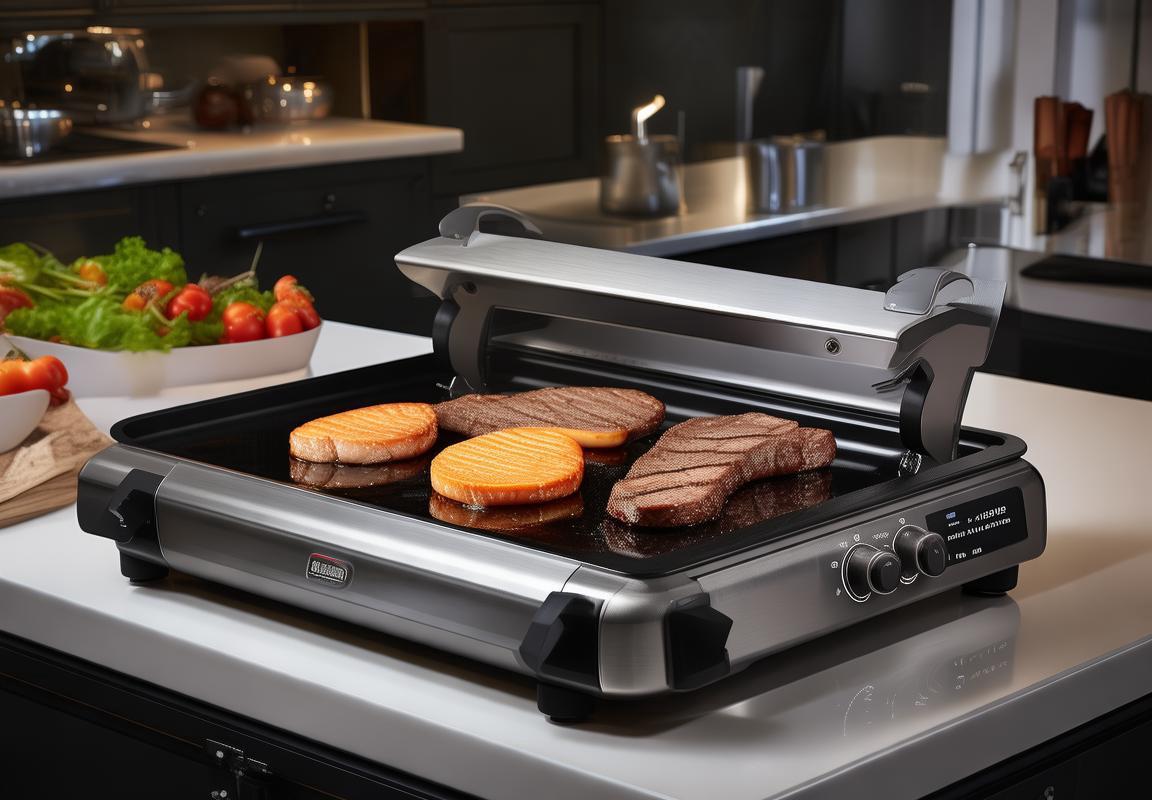
The Importance of Quality Control in Contact Grill Production
In the world of contact grill production, quality control is not just a process; it’s the backbone of a successful business. It ensures that every grill that leaves the factory meets or exceeds the highest standards of performance, safety, and durability. Here’s why quality control is paramount in this industry:
The Safety FactorA contact grill is a kitchen appliance that can reach high temperatures, which means safety is paramount. Quality control measures are in place to ensure that all components are durable and that the grill’s design minimizes the risk of electrical hazards or overheating. From the materials used in the heating elements to the insulation around the grill, every detail is scrutinized to prevent accidents.
Consistent PerformanceCustomers expect their contact grills to perform consistently, delivering the same level of heat and cooking results every time. Quality control involves rigorous testing to ensure that the grill maintains even heat distribution across the cooking surface. This not only guarantees a professional-grade cooking experience but also prolongs the life of the appliance.
Durability Through MaterialsThe choice of materials is crucial in contact grill production. High-quality suppliers use stainless steel for the cooking plates, which not only withstands high temperatures but also resists corrosion and maintains its appearance over time. Quality control checks the integrity of these materials, ensuring that each grill can withstand years of use without warping or losing its functionality.
Precision EngineeringEvery contact grill is a marvel of precision engineering. Quality control ensures that all parts fit together perfectly, with no gaps or loose connections that could lead to performance issues. From the hinges that secure the lid to the control panels that regulate temperature, each component must be precisely manufactured and tested.
Environmental ComplianceIn an era where environmental concerns are at the forefront, quality control also involves ensuring that the production process adheres to environmental standards. This includes the use of sustainable materials, proper disposal of hazardous waste, and energy-efficient manufacturing practices. A reputable supplier takes pride in its commitment to eco-friendly operations.
Customer SatisfactionUltimately, quality control is about customer satisfaction. A high-quality contact grill not only meets the needs of the consumer but also exceeds their expectations. By maintaining strict quality standards, suppliers can build a loyal customer base and a strong reputation in the market.
Regulatory StandardsThe contact grill industry is subject to various regulations and certifications that dictate the safety and performance of the appliances. Quality control processes ensure that all grills comply with these standards, which can vary by country. This compliance is not just about avoiding fines; it’s about building trust with regulatory bodies and consumers alike.
Innovation and Continuous ImprovementA good quality control process is not static. It evolves with new technologies and consumer demands. Suppliers that invest in continuous improvement are more likely to innovate and introduce new features that enhance the cooking experience. Quality control is the driving force behind these advancements.
Training and ExpertiseThe people behind the quality control process are as important as the processes themselves. A reputable supplier invests in training its staff to understand the intricacies of contact grill production. This expertise ensures that every grill is inspected by someone who knows what to look for, from minor defects to major safety concerns.
Feedback LoopQuality control is not a one-time event but an ongoing process. A robust system includes a feedback loop that allows for continuous improvement. By collecting data on customer experiences, identifying issues, and making adjustments, suppliers can ensure that their grills are always meeting the highest standards.
In conclusion, quality control in contact grill production is essential for safety, performance, and customer satisfaction. It’s the unseen force that ensures each grill leaves the factory ready to deliver a perfect meal time after time. A commitment to quality is a commitment to the future of the business and the satisfaction of its customers.
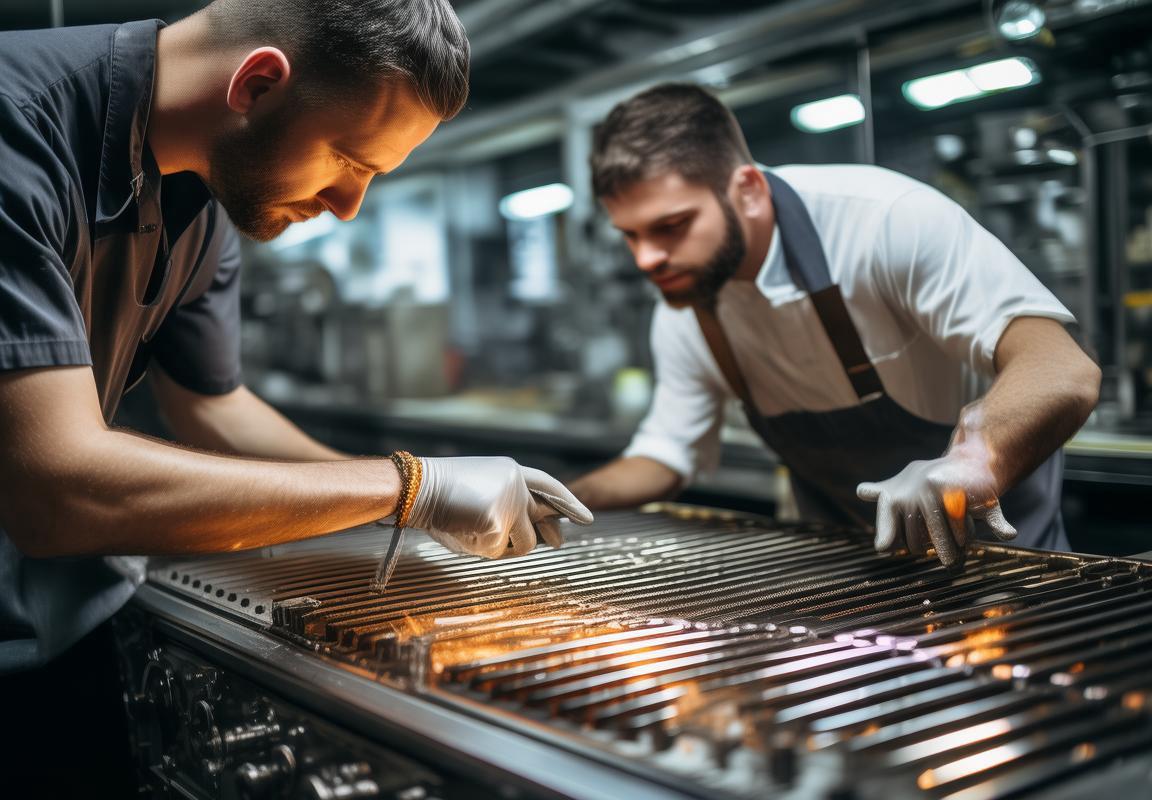
How to Get Started with Your Custom Contact Grill Project
Navigating the initial stages of a custom contact grill project can be an exciting yet challenging endeavor. Here’s a detailed guide to help you embark on this journey with confidence:
-
Define Your VisionBefore diving into the specifics, it’s crucial to have a clear vision for your custom contact grill. Consider the intended use, target market, and the unique features that will differentiate your product from competitors. Sketch out your ideal design and functionality, keeping in mind user convenience and safety.
-
Research Potential SuppliersStart by researching potential ODM (Original Design Manufacturer) suppliers. Look for companies with a strong track record in the industry, particularly those specializing in contact grill manufacturing. Check reviews, testimonials, and case studies to gauge their expertise and reliability.
-
Evaluate Technical SpecificationsOnce you’ve identified a few potential suppliers, delve into their technical specifications. Ensure they can accommodate your design requirements, including material choices, heating elements, and safety features. Discuss the technical feasibility of your project and seek input on how to optimize performance and efficiency.
-
Discuss Cost and BudgetCost is a significant factor in any project. Engage in detailed discussions with suppliers about pricing, including the cost of materials, labor, and any additional services such as design assistance or customization. Be transparent about your budget and ask for cost breakdowns to understand where your money is being allocated.
-
Review Prototyping and Production CapabilitiesA reputable supplier will offer prototyping services to bring your concept to life. Discuss their prototyping process, including the timeline and any potential modifications needed before moving to mass production. Ensure that the supplier has the capacity to scale up production efficiently without compromising on quality.
-
Establish Communication ProtocolsEffective communication is key to a successful project. Establish clear lines of communication with your supplier, including regular check-ins, progress updates, and the ability to address any concerns promptly. Ensure that both parties are on the same page regarding expectations and deliverables.
-
Finalize Legal and Contractual AgreementsBefore proceeding, finalize all legal and contractual aspects of the project. This includes terms of payment, intellectual property rights, and any guarantees or warranties provided by the supplier. It’s essential to have a legally binding contract that protects both your interests and those of the supplier.
-
Collaborate on Design and EngineeringWork closely with the supplier’s design and engineering teams to refine your concept. Offer feedback and be open to suggestions that could enhance the functionality, aesthetics, or safety of your contact grill. This collaboration is where your vision begins to take tangible shape.
-
Monitor Quality AssuranceThroughout the prototyping and production stages, maintain a vigilant eye on quality assurance. Request samples and conduct thorough testing to ensure that the final product meets your standards. Don’t hesitate to request modifications if any issues arise.
-
Plan for Marketing and DistributionOnce production is complete, consider how you’ll market and distribute your custom contact grill. Discuss with your supplier any branding opportunities, packaging suggestions, or marketing materials they can provide. Also, explore logistics and shipping options to ensure your product reaches customers efficiently.
-
Prepare for Post-Launch SupportCustomer satisfaction is paramount. Discuss with your supplier how they plan to handle post-launch support, including warranty services, customer service, and potential repairs or replacements. This ensures that your customers have a positive experience with your product long after the sale.
-
Reflect and IterateAfter the launch, take the time to reflect on the process and the final product. Gather feedback from customers and stakeholders to identify areas for improvement. This iterative approach can help you refine your product for future iterations or new projects.
By following these steps, you can get your custom contact grill project off the ground and into the hands of consumers with confidence, ensuring that your product not only meets but exceeds expectations.
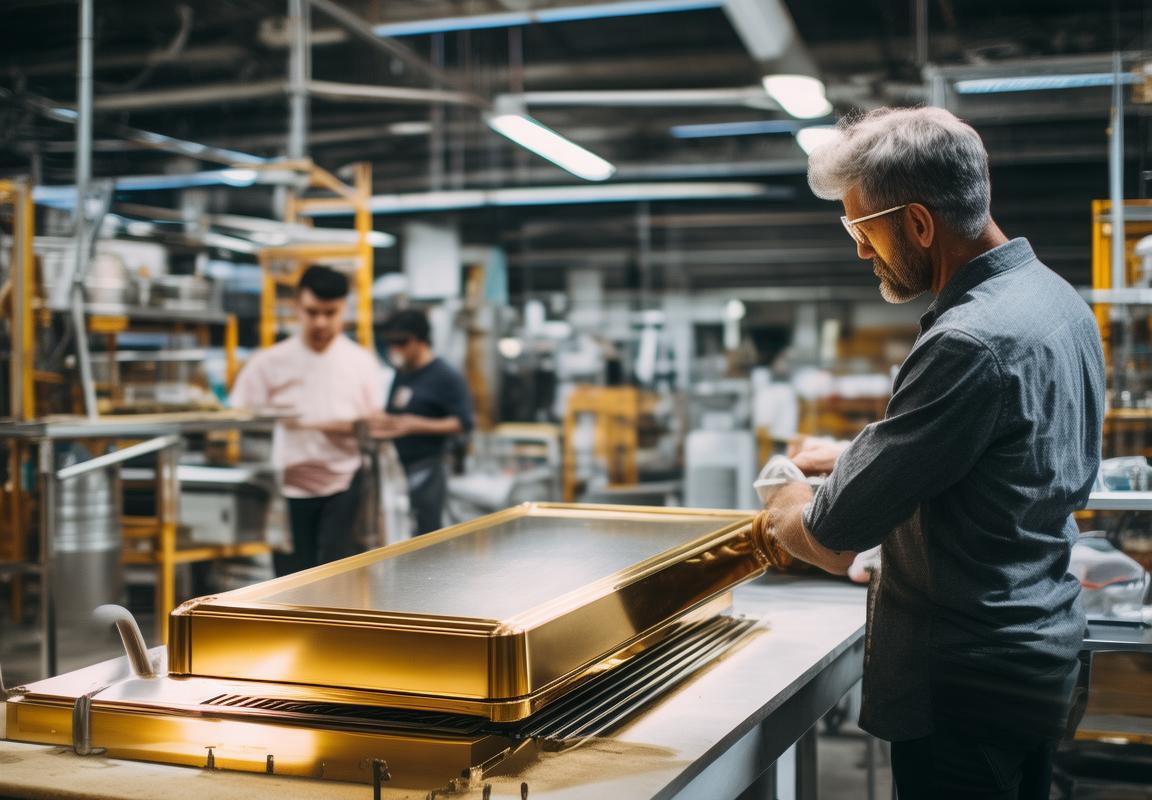
Frequently Asked Questions About Contact Grill Suppliers and ODM Services
- What is ODM, and How Does It Apply to Contact Grill Suppliers?
- The Role of ODM in Tailoring Contact Grills to Specific Market Demands
- Understanding the Design Process in ODM Contact Grill Projects
- The Benefits of Collaborating with an ODM Supplier for Customization
- How ODM Suppliers Handle Intellectual Property and Design Rights
- The Importance of Prototyping in the ODM Process
- The Role of Quality Assurance in ODM Contact Grill Production
- How ODM Suppliers Can Help Optimize Production Costs
- The Process of Scaling Up Production for ODM Contact Grills
- The Role of Market Trends in Guiding ODM Contact Grill Design
- How ODM Suppliers Stay Updated with Industry Standards
- The Challenges of Sourcing Components for Custom ODM Contact Grills
- The Importance of After-Sales Service in ODM Supplier Relationships
- How ODM Suppliers Can Assist with Marketing and Branding
- The Process of Revising and Improving ODM Contact Grill Designs
- The Role of ODM Suppliers in Ensuring Regulatory Compliance
- How ODM Suppliers Handle Custom Orders for Various Market Segments
- The Benefits of Long-Term Partnerships with ODM Contact Grill Suppliers
- The Impact of Global Supply Chains on ODM Services
- The Importance of Effective Communication in ODM Projects
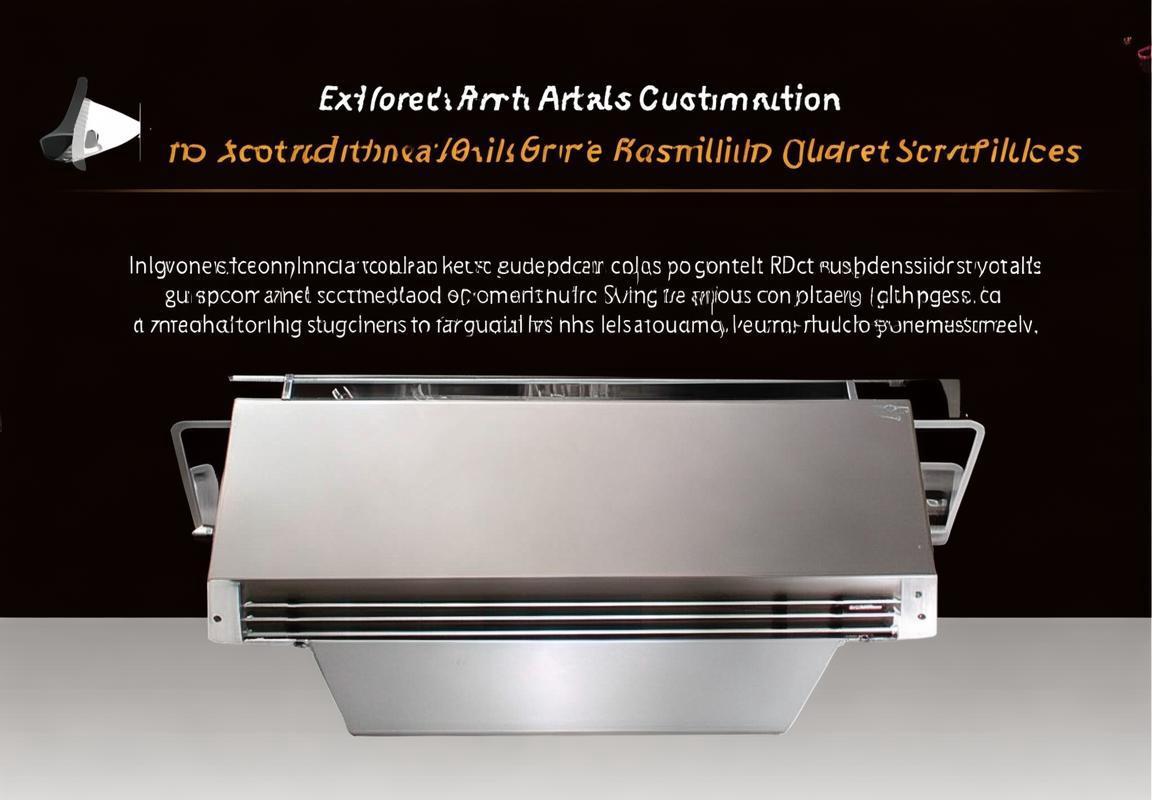
Conclusion: Transform Your Grill Business with the Right Supplier
The right supplier can be the game-changer for your grill business. By partnering with a reputable contact grill supplier, you’re not just acquiring a product; you’re investing in the future of your brand. Here are some key points to consider when it comes to transforming your grill business with the right supplier:
Your supplier should be a reflection of your brand values. They need to share your commitment to quality, customer satisfaction, and innovation. When your brand and your supplier are aligned, it creates a synergy that can propel your business forward.
Keep in mind that a good supplier is not just someone who delivers products on time. They should also offer excellent communication, ensuring that any issues are addressed swiftly and efficiently. This transparency and reliability can save you countless hours and potential headaches in the long run.
Investing in a supplier who prioritizes after-sales support can mean the difference between a smooth-running business and one that’s constantly plagued by problems. Look for a supplier who not only promises support but also delivers on that promise with a team of trained professionals ready to assist you.
When considering a supplier, look at the breadth and depth of their product range. A supplier that offers a diverse selection allows you to cater to a wider audience and adapt to market trends. Whether you’re looking for a compact grill for a small outdoor setting or a commercial-grade unit for a busy restaurant, your supplier should be able to meet your varied needs.
A supplier’s willingness to invest in research and development is a sign that they are committed to staying ahead of the curve. By offering cutting-edge features and technology, they can help your business maintain a competitive edge.
In today’s fast-paced world, the ability to customize products is crucial. A supplier that offers ODM (Original Design Manufacturer) services allows you to tailor your products to your brand’s unique identity, ensuring that you stand out in a crowded market.
A reputable supplier will have a robust quality control system in place. This system should not only meet industry standards but also exceed them, providing you with confidence in the products you’re selling.
A supplier’s financial stability can be an indicator of their ability to continue providing excellent service over the long term. Look for signs of financial health, such as steady growth and a strong presence in the market.
Collaboration is key when it comes to supplier relationships. You should feel like a valued partner rather than just another client. This partnership can lead to exclusive deals, early access to new products, and a sense of exclusivity that can boost your business.
Don’t underestimate the power of testimonials and reviews. What are other businesses saying about their experiences with the supplier? Word-of-mouth can be a powerful tool, and a supplier with a strong track record of satisfied customers is likely to be a good fit for your business.
A good supplier will have a deep understanding of the market and will be able to provide valuable insights into what’s trending and what’s not. They should be able to offer guidance on pricing, product positioning, and marketing strategies.
The logistics of working with a supplier can be complex, especially when dealing with international partners. Look for a supplier with a streamlined process, from ordering to delivery, that ensures your inventory is managed efficiently.
When considering a supplier, don’t overlook the importance of environmental responsibility. A supplier that practices sustainable manufacturing and shipping can align with your brand’s values and appeal to a growing segment of environmentally conscious consumers.
In conclusion, transforming your grill business with the right supplier means finding a partner who understands your brand’s vision, delivers on their promises, and offers a level of service that enhances your business. Whether it’s through custom solutions, top-notch quality control, or exceptional after-sales support, the right supplier can help you achieve your business goals and elevate your brand in the competitive grill market.